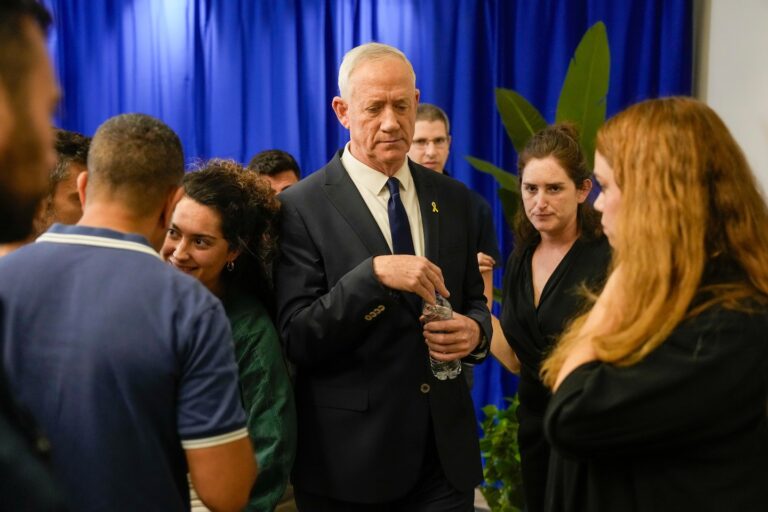“Unfortunately, Prime Minister Netanyahu is preventing us from achieving a real victory,” Gantz said in a prime-time television broadcast, arguing that new leadership was needed to help Israel navigate the growing crisis.
Instead of drawing up a day-after plan for war in Gaza, taking decisive action against Hezbollah in the north or working toward a ceasefire and hostage release agreement with Hamas, Netanyahu made “empty promises” of “total victory,” he said.
Netanyahu responded before Gantz finished speaking, posting on X, “Israel is at an existential war on multiple fronts. Benny, now is not the time to abandon the war. It’s time to join forces.”
Get caught up in
Summarised stories to keep you up to date
Gantz is seen as Netanyahu’s main political rival and regularly leads Israelis in polls when they ask who they think is best suited to lead the country. While Gantz’s resignation would not immediately threaten Netanyahu’s coalition government, it could set off political chain reactions and embolden critics of the prime minister at home and abroad, analysts said.
An hour after Gantz’s speech, Gadi Eisenkot, a former Israeli army chief of staff who had joined the war cabinet, and Israeli Minister Chili Tropper submitted their resignations.
“We have witnessed that the decisions of the government and you are not always based on national considerations and the interests of the country,” Eisenkot wrote in the letter to Netanyahu. “Foreign and political considerations have entered the discussion forum and influenced decision-making.”
Netanyahu still has a 64-seat majority in the 120-seat Knesset, the Israeli parliament, but there is a risk that more defections will come from his party.
“At this moment, leadership and courage means not just saying the right thing but doing the right thing,” Gantz said in his speech, addressing Israeli Defense Minister Yoav Gallant, a member of Netanyahu’s own Likud party and a member of his wartime cabinet.
Gallant, a moderate in Netanyahu’s increasingly far-right coalition government, has privately and publicly urged him to find an alternative to Hamas in Gaza, which remains a strong fighting force and the exclave’s de facto governing power despite eight months of brutal war. Gallant has also voiced support for reaching an agreement with militant groups to bring home the 120 hostages still being held, even if painful compromises are required.
President Biden has been urging Israel for months to commit to a “day after” plan for the Gaza war, and surprised officials in Jerusalem last week by releasing details of an Israeli ceasefire proposal. On Tuesday, Biden told TIME magazine he has “good reason” to believe Netanyahu is prolonging the conflict for his own gain.
Itamar Ben Gvir, the far-right Minister of National Security, dismissed Gantz’s resignation, writing on X that “the time has come to take courageous decisions, realise real deterrence and bring security to the people of North and South Israel and all of Israel.”
Finance Minister Bezalel Smotrich, another member of the ultranationalist coalition, accused Netanyahu’s critics of playing into the hands of Israel’s enemies, writing on social media that “this is exactly what Sinwar, Nasrallah and Iran wanted and unfortunately you are fulfilling their demands,” he was referring to Hamas military leaders and Hezbollah fighters, whose fighters have stepped up attacks on Israel in recent weeks.
Gantz said the imminent threat facing the country meant that a war cabinet could no longer be maintained. “Political considerations are causing hesitation and postponement of fateful strategic decisions,” he said on Sunday. “In the autumn, one year after the October 7 tragedy, elections must be held to form a government that can win the people’s trust and rise to the challenges.”
In the aftermath of the Oct. 7 attack, Israel’s deadliest single attack in history, Netanyahu formed a limited six-person war cabinet to secure his own position as head of government and block his extremist coalition partners from taking part in strategic decisions about the Gaza war.
The inclusion of Gantz and his party “boosted confidence among broad swaths of the Israeli public that important wartime decisions are being made with moderate voices and broad national representation, not narrow political interests,” said Yohanan Plesner, president of the Israel Democracy Institute, a nonpartisan Israeli think tank.
“The government has been in a very difficult position for some time now, and we are very grateful to them for their support,” Gantz said in a statement.
Gantz postponed his announcement for a day following Saturday’s dramatic Israeli military operation that rescued four hostages from the Gaza Strip and sparked celebrations across the country – a rare and fleeting moment of national unity.
“Alongside our natural joy at this achievement, we must not forget that the return of the other 120 hostages and other security challenges facing Israel remain as important as ever,” Gantz said on Saturday.
Netanyahu, the country’s longest-serving prime minister, has never accepted responsibility for the Oct. 7 fiasco. He has dismissed calls for an investigation into the security failures that day, arguing such questions should be considered after the war is over.
Others didn’t wait. Hours before Gantz’s speech on Sunday, Brigadier General Avi Rosenfeld, who was Israeli military commander in Gaza at the time of the Hamas-led attack, announced he was stepping down.
“I have failed in my life’s mission to protect the communities along the Gaza border,” Rosenfeld said. “Everyone must take responsibility for their role.”

